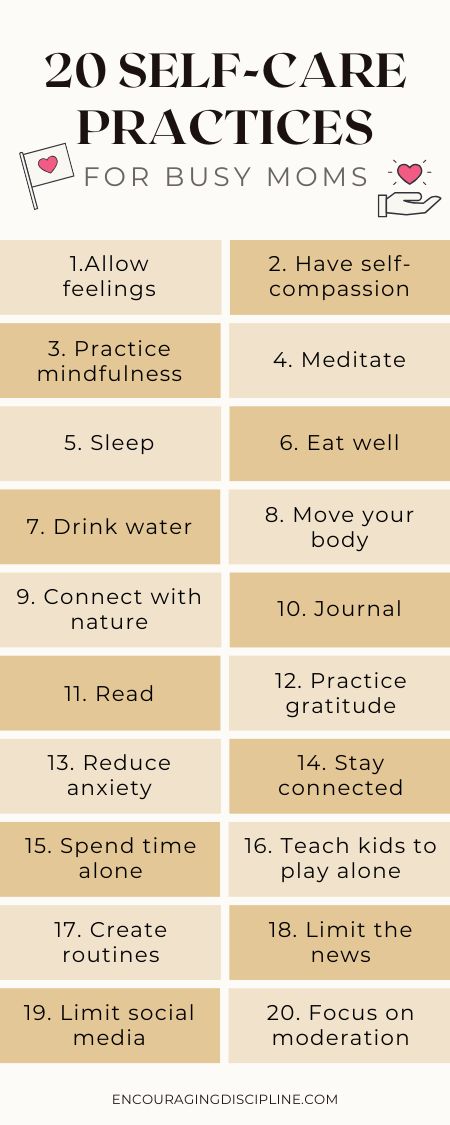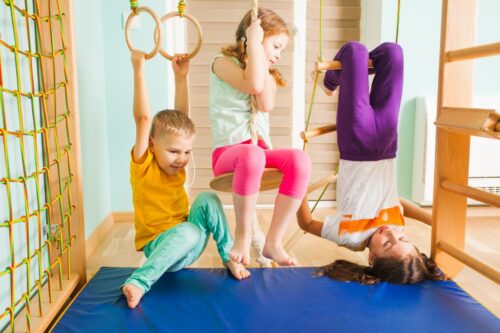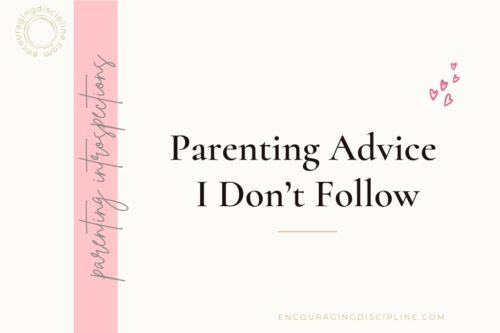20 Self-Care Practices for Busy Moms
Self-care has become an important goal to have during this time. I will explain why below. Also, I will explore what self-care is, what it isn’t, and things you can do for true, energizing self-care. Meeting our own needs is not selfish. It will benefit our children as much as it benefits us.
Key Points
► Instead of short bouts of fleeting feel-good moments, self-care involves activities that give us lasting peace and energy.
► Ignoring our own needs does not count as selflessness.
► When our energy cup is full, we have plenty to give to others and show up as the parent we aspire to be.
►Self-care focuses on doing things that are good for our body and soul, increasing our happiness and well-being.
Table of Contents
What Self-Care Is and Isn’t
When I first heard about self-care, when my kids were very little and I was at my wits’ end, I was under the false impression that it meant “doing something special for myself”, treating myself. Things like putting on make-up, getting a massage, going out with my friends, taking a bubble bath, or treating myself to a delicious chocolate cake for no reason.
While all these things can make us feel good in the moment, they are not what I consider now to be true self-care. They offer a quick and brief uplifting feeling, leaving us with the same exhaustion, loneliness, boredom, emptiness, or anxiety after.
True self-care doesn’t just temporarily cover up unpleasant underlying feelings with a shot of ephemeral happiness. It takes care of those uncomfortable feelings and fills us up with long-lasting peace and energy.
Don’t Have Time for Self-Care?
You may be thinking, “I don’t have time for self-care! I am too busy taking care of my kids’ needs and the housework, etc.”
But I invite you to look at this from a different perspective.
You are not being selfless if you ignore your own needs.
In reality, you are giving less because your body is on red and trying really hard to keep all resources to itself.
Imagine we are all carrying around an energy cup. If our cup is empty, we don’t have much to give. But if our cup is full, then we can share our energy and peace.
My mom always used to tell me, “If you don’t take care of yourself, then who will?”
Give Self-Care a Chance
- Because we are worth it
- We want to have good memories and enjoy our children fully
- Our children need and deserve the real us, not a zombie version of us
- If we are constantly snappy, our children grow up believing they are a burden
- We are healthier and happier
- We feel more satisfied and confident in our parenting
- Because we love our children.
Put Yourself First?
I often hear people say that we need to put ourselves first. And in a sense this is true. However, we run the risk of misinterpreting this statement.
I am not saying to put ourselves first on our to-do list. At the same time, I want to highlight that we shouldn’t put ourselves last either. And most certainly we shouldn’t forget to put ourselves on the list.
Similarly, I am not suggesting we neglect our kids so we can give ourselves self-care. But I think that we should take care of our own needs alongside our children’s.
In essence, if we take care of ourselves, then we will be even more present for our children.
Related: Are You a Good Enough Parent?
20 Practices for Self-Care
As I mentioned before, self-care really means doing something that refills us with lasting energy and peace. It means making choices that are good for us.

1. Allow feelings
Allow yourself to feel whatever comes up. Don’t try to stuff those emotions, to reject them, hide them. Let them be.
Be aware that feelings can only exist in our body for about 90 seconds if we allow them to just be.
Dr. Joan Rosenberg explains that, when we have certain thoughts, our brain produces chemicals that are sent throughout our body. These chemicals cause sensations in the body, and then they are flushed out of our bloodstream. This process takes about 90 seconds and is like a wave. It repeats itself whenever we repeat the triggering thoughts in our minds.
Therefore, if we can stay with the unpleasant sensations in our body and detach ourselves from the thoughts that trigger them, we can get through the emotion wave more quickly.
We just have to remind ourselves that the feeling always subsides, just like the wave, and that we can let go of the thought about the situation or memory that triggered the feeling.
2. Have self-compassion
After the feelings go away, offer yourself some love. It’s ok to feel unpleasant feelings. They are part of the human experience. Everybody feels them.
Here are some ideas to explore for self-compassion:
- Remind yourself you are not alone.
- Pay attention to your self-talk and adjust it if it is critical and unkind.
- Imagine how you would talk to a friend who came to you feeling the way you are feeling.
- Offer yourself the same support.
- Then try to feel pure love for yourself and envelop yourself in it. Stay with that feeling.
3. Practice mindfulness
Dr. Joan Rosenberg said that “the degree of our happiness and well-being on a day-to-day basis is determined by the little choices we make moment-to-moment. Make the choice to stay fully present. It’s about awareness, not avoidance.”
You hate being at home, and unable to take your kids to the playground. It stinks. So you want to avoid this unpleasant feeling. But if you are aware of it and stay with it, you will feel much better than if you try to avoid it.
4. Meditate
Meditation can actually be an incredibly refreshing and replenishing activity. By sitting with our breath, we become aware of our own aliveness. Meditation increases inner peace, improves sleep, and promotes overall calmness.
5. Sleep
Sleep is important for both mental and physical health. Our bodies do important repair work during sleep.
When I am tired, I am less patient, I feel less in control, and I am more reactive. It is harder for me to access my kindest and wisest self, or my positive discipline tools.
On the contrary, when I am rested, I feel like the best parent. I am calm, move and speak more deliberately. When I sleep enough, I can come up with solutions or activities for my kids, and also I am more creative when it comes to diffusing conflicts and power struggles.
A very important “side-effect”? My kids are calmer and don’t whine, argue, or bother me as much. Why? Because they sense that I am in control. Or rather that my upstairs brain is in control and my downstairs brain is calm and resting.
I am not a frazzled child pretending to be a parent. I am an actual adult who has all her senses functioning at full capacity, therefore protecting them if anything bad were to happen.
6. Eat well
A healthy diet not only has an impact on the body but also on our mood. So make sure you get enough fresh fruits and vegetables, full of vitamins.
TIP
A good trick is to wash and cut up fruit in the morning and have it available on a plate or in a bowl in the middle of the table. It is appealing visually and you will be tempted to grab a piece of fruit whenever you pass it by.
7. Drink water
I used to always forget to drink enough water. Then, right before bedtime, I would realize how dehydrated I was. So I came up with a trick to get me to drink enough water throughout the day. I put a sticky note on the backsplash in my kitchen with the word water on it. Now I drink a full glass of water first thing in the morning when I get to the kitchen. And during the day I am reminded to reach for the pitcher and pour myself a glass of water. It helps me to be more aware of my body and my needs.
8. Move your body
You can go out for a walk or a jog. But roughhousing or dancing with your children also counts.
9. Connect with nature
Take a walk in the park. If you have a yard, either sit in your backyard or do some yard work. If you do not have a yard, then get a chair or a blanket and sit on your balcony. Close your eyes and listen to the rustle of the trees, the trills of the birds, and the whooshing of the wind. Allow the sun to warm your face and arms, and feel the warmth entering your whole body. Nature has a rejuvenating effect on us.
10. Journal
When we journal, we go inward. We focus on what we are thinking and feeling. Journaling is a mindfulness practice in itself, with many benefits for our well-being. However, you don’t have to write every day to reap the benefits of journaling. You can write on an as-needed basis, but make sure you take a few minutes at least once a week to check in with yourself through writing.
11. Read
Reading can reduce stress and improve your mood and relaxation. It has also been shown to improve sleep and enhance social skills. Getting lost in a good book is always a better alternative to overstimulating our brains with social media, movies, alcohol, or sugar.
12. Practice gratitude
Numerous studies have linked the practice of gratitude to higher levels of happiness and health, and better abilities to deal with adversity. But don’t worry, you don’t have to start going around the dinner table to count your blessings, research suggests that gratitude has a beneficial effect even when it is not shared. You can take a few moments at bedtime to focus on things, people, or experiences you are grateful for in your life or day. Or you can write about them in your journal.
13. Reduce anxiety
Periodically look at the things that cause you stress. Identify the things that you can control and the ones that are out of your control. Sit with the things you can’t control until you can fully accept them and let go of them. Then focus on the ones that you can really change to help with your stress.
14. Stay connected
Now is the time to distance yourself from those people in your life who used to cause you stress. You have an excuse to stay away.
But just because we are practicing social distancing doesn’t mean we have to become isolated. There are many platforms that you can use to stay in touch with people who make you feel good.
Decide on a day or days when you call dear family members and friends. However, screens can be exhausting. So make sure you pay attention to your body and learn to end a conversation when it becomes tiring.
15. Spend time alone
We all need some time alone. Taking care of children involves stress and physical and emotional demands. This time is best used during the day, not at night, when we are already tired. Try to find someone to watch your children for 30 minutes, an hour, or however long you need. It is beneficial to spend some quiet, alone time, away from kids. When you come back, you feel refreshed, with more energy and patience.
16. Teach your kids to play alone
This may take some time, but it is a great help for parents. Once your children are immersed in play, make sure you use that time wisely and really focus on yourself, rather than spending your time mindlessly scrolling through your phone. A meditation session, some reading, journaling, or exercise are great activities to do while children are playing independently.
Related: Getting Children to Play Alone
17. Create routines
Routines create a sense of safety for our primitive, downstairs brain. They also save our brain energy. When we have clear routines that we follow, we don’t have to spend energy figuring out what to do next, it becomes automatic.
With that being said, make sure you include something new periodically, to keep things fresh and interesting, and to avoid boredom.
18. Limit the news
Lots of misinformation can create more anxiety for us. At the same time, it is hard to stay on top of everything that is talked about in the media, to check to see if it is accurate and factual or manipulated information. Limiting the amount of news that we consume, as well as selecting our sources carefully, is more practical.
19. Limit social media
More and more studies are linking too much social media networking with a decline in our mental health. And they all conclude that lower levels of social media usage are correlated with better mental health.
20. Focus on moderation
It’s ok to browse your social media news feed, it’s ok to watch movies, go for a run, or have some chocolate. But anything you do becomes unhealthy if it is done excessively. Periodically revisit your activities and identify if there is a tendency to overdo things. That is a signal that you are harboring some bothersome feelings that you are trying to distract yourself from.
In conclusion, to figure out if an activity counts as self-care, ask yourself, “Does it give me lasting energy and peace?” If the answer is no, then it is probably not good for your needs. Similarly, if the thought of doing something is causing you more stress (like the recommendation to learn something new or pick up a new hobby), then stay away. It doesn’t count as self-care.
Also, please don’t make self-care about checking things off a list. That would be stressful. For me, some days I am able to be really good to myself and in flow. And some days not so much. I haven’t found the perfect balance. But it is a priority, so I keep working on it daily.
Final Thoughts
As you can see, most of these self-care practices can be done with children. There is no need to escape to do them. All it takes is the intention and a few minutes every day. As Dr. Joan Rosenberg said, the little choices we make moment-to-moment determine our happiness and well-being. The only big choice we have to make is the decision to make self-care a priority.







